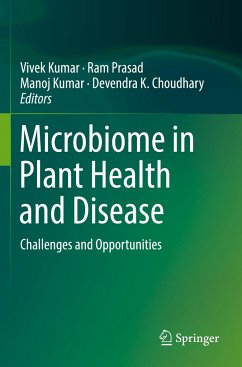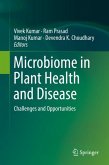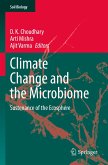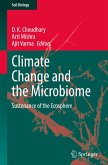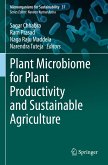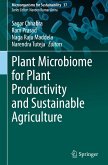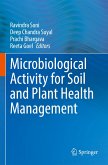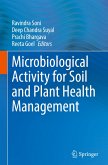Microbiome in Plant Health and Disease
Challenges and Opportunities
Herausgegeben:Kumar, Vivek; Prasad, Ram; Kumar, Manoj; Choudhary, Devendra K.
Microbiome in Plant Health and Disease
Challenges and Opportunities
Herausgegeben:Kumar, Vivek; Prasad, Ram; Kumar, Manoj; Choudhary, Devendra K.
- Broschiertes Buch
- Merkliste
- Auf die Merkliste
- Bewerten Bewerten
- Teilen
- Produkt teilen
- Produkterinnerung
- Produkterinnerung
The book discusses the complex interactions between plants and their associated microbial communities. It also elucidates the ways in which these microbiomes are connected with the plant system, and how they affect plant health. The different chapters describe how microbiomes affect plants with regard to immunity, disease conditions, stress management and productivity. In addition, the book describes how an 'additional plant genome' functions as a whole organ system of the host, and how it presents both challenges and opportunities for the plant system. Moreover, the book includes a dedicated…mehr
Andere Kunden interessierten sich auch für
![Microbiome in Plant Health and Disease Microbiome in Plant Health and Disease]() Microbiome in Plant Health and Disease116,99 €
Microbiome in Plant Health and Disease116,99 €![Climate Change and the Microbiome Climate Change and the Microbiome]() Climate Change and the Microbiome177,99 €
Climate Change and the Microbiome177,99 €![Climate Change and the Microbiome Climate Change and the Microbiome]() Climate Change and the Microbiome177,99 €
Climate Change and the Microbiome177,99 €![Plant Microbiome for Plant Productivity and Sustainable Agriculture Plant Microbiome for Plant Productivity and Sustainable Agriculture]() Plant Microbiome for Plant Productivity and Sustainable Agriculture177,99 €
Plant Microbiome for Plant Productivity and Sustainable Agriculture177,99 €![Plant Microbiome for Plant Productivity and Sustainable Agriculture Plant Microbiome for Plant Productivity and Sustainable Agriculture]() Plant Microbiome for Plant Productivity and Sustainable Agriculture177,99 €
Plant Microbiome for Plant Productivity and Sustainable Agriculture177,99 €![Microbiological Activity for Soil and Plant Health Management Microbiological Activity for Soil and Plant Health Management]() Microbiological Activity for Soil and Plant Health Management177,99 €
Microbiological Activity for Soil and Plant Health Management177,99 €![Microbiological Activity for Soil and Plant Health Management Microbiological Activity for Soil and Plant Health Management]() Microbiological Activity for Soil and Plant Health Management177,99 €
Microbiological Activity for Soil and Plant Health Management177,99 €-
-
-
The book discusses the complex interactions between plants and their associated microbial communities. It also elucidates the ways in which these microbiomes are connected with the plant system, and how they affect plant health.
The different chapters describe how microbiomes affect plants with regard to immunity, disease conditions, stress management and productivity. In addition, the book describes how an 'additional plant genome' functions as a whole organ system of the host, and how it presents both challenges and opportunities for the plant system. Moreover, the book includes a dedicated section on using omics tools to understand these interactions, and on exploiting them to their full potential.
The different chapters describe how microbiomes affect plants with regard to immunity, disease conditions, stress management and productivity. In addition, the book describes how an 'additional plant genome' functions as a whole organ system of the host, and how it presents both challenges and opportunities for the plant system. Moreover, the book includes a dedicated section on using omics tools to understand these interactions, and on exploiting them to their full potential.
Produktdetails
- Produktdetails
- Verlag: Springer / Springer Nature Singapore / Springer, Berlin
- Artikelnr. des Verlages: 978-981-13-8497-4
- 1st edition 2019
- Seitenzahl: 552
- Erscheinungstermin: 25. August 2020
- Englisch
- Abmessung: 235mm x 155mm x 30mm
- Gewicht: 826g
- ISBN-13: 9789811384974
- ISBN-10: 9811384975
- Artikelnr.: 59894769
- Herstellerkennzeichnung Die Herstellerinformationen sind derzeit nicht verfügbar.
- Verlag: Springer / Springer Nature Singapore / Springer, Berlin
- Artikelnr. des Verlages: 978-981-13-8497-4
- 1st edition 2019
- Seitenzahl: 552
- Erscheinungstermin: 25. August 2020
- Englisch
- Abmessung: 235mm x 155mm x 30mm
- Gewicht: 826g
- ISBN-13: 9789811384974
- ISBN-10: 9811384975
- Artikelnr.: 59894769
- Herstellerkennzeichnung Die Herstellerinformationen sind derzeit nicht verfügbar.
Vivek Kumar is working as Associate Professor, Himalayan School of Biosciences, Swami Rama Himalayan University, Jolly Grant, Dehradun, India and is leading plant-microbe-interaction, bioremediation and microbial ecology research group. He has obtained his masters and doctoral degree from CCS Haryana Agricultural University, Hisar, India. Serving as editor and reviewer of several reputed international journals. Has more than hundred publications to his credit. He has authored a practical manual book and edited several books with Springer Nature. He had also served as Microbiologist in Public Authority of Agricultural Affairs & Fish Resources, Kuwait and has been credited with first time reporting of Pink Rot inflorescence disease of Date palm in Kuwait caused by Serratia marcescens. Ram Prasad is associated with Amity Institute of Microbial Technology, Amity University, Uttar Pradesh, India since 2005. His research interests include applied microbiology, plant-microbe-interaction, sustainable agriculture and nanobiotechnology. Dr. Prasad has more than one hundred fifty publications to his credit, including research papers, review articles, book chapters, five patents issued or pending, and several edited or authored books. Dr. Prasad has been awarded the Young Scientist Award and Prof. J.S. Datta Munshi Gold Medal by the International Society for Ecological Communications; FSAB fellowship by the Society for Applied Biotechnology; the American Cancer Society UICC International Fellowship for Beginning Investigators, USA; Outstanding Scientist Award in the field of Microbiology by Venus International Foundation; BRICPL Science Investigator Award, and Research Excellence Award. He serves as an editorial board member for Frontiers in Microbiology, Frontiers in Nutrition, Academia Journal of Biotechnology. Previously, Dr. Prasad served as Visiting Assistant Professor, Whiting School of Engineering, Department of Mechanical Engineering at Johns Hopkins University, USA and presently works as a Research Associate Professor at School of Environmental Sciences and Engineering, Sun Yat-Sen University, Guangzhou, China. Manoj Kumar is currently working as Associate Professor, Life Sciences, Central University of Jharkhand, heading the department since 2018 onwards. Dr. Kumar is having long research experience in Plant Developmental Biology with doctorate and postdoctoral research experiences from prestigious organizations (India and abroad). He has opted academic career with a passion in fundamental sciences (plant developmental biology) where he excelled numerous collaborative research activities at national and international levels. He has published valuable research inputs in accredited journals and edited books, also guided several students at master, M. Phil., doctorate and post-doctorate levels. He has been principle investigator of several projects of national funding agencies- DBT, DRDO etc. He is associated as editor and reviewer with several research journals and offering consultancy to several biotechnology firms at international level. At present he is principal investigator of DBT-BUILDER program and leading an elite research group at multidisciplinary level. Dr. Kumar is exploring academic world with a vision of empowering young generation with fact-finding approach destined for rural India. Devendra K. Choudhary shows his presence as Associate Professor at Amity Institute of Microbial Technology. He is active researcher and operated major projects sponsored by DBT, DST and SERB, New Delhi, India, as principal investigator and co-investigator. He has published quorum of research/review articles along with several book chapters for reputed journals and edited several books through Springer and filed three patents to India Patent Office, New Delhi. He has supervised several research scholars for their doctoral programme. In addition, he is recipient of NASI-life membership and accorded with Indian National Science Academy (INSA) visiting and summer research fellowship.
Chapter 1. Applications of Plant-Microbe Interactions in Agro-ecosystems.- Chapter 2. Exploring the Phyllosphere Bacterial Community for Improving Tree Crops Protection.- Chapter 3. Microbes Core to Sustainable Agriculture.- Chapter 4. Bacteria Inducing Legume Nodules Involved in the Improvement of Plant Growth, Health and Nutrition.- Chapter 5. Applications of Beneficial Microbe in Arid and Semiarid Agroecosystem: IAA Producing Bacteria.- Chapter 6. Role of Endophytes in Plant Health and Abiotic Stress Management.- Chapter 7. Affirmative Plant-Microbe Interfaces towards Agro-ecosystem Sustainability.- Chapter 8. Emerging Insight on Rhizobacterial Functions.- Chapter 9. Microbiome in Plant Health and Disease: Challenges and Opportunities.- Chapter 10. Influence of Rhizospheric Microbiome in Plant Health Management.- Chapter 11. Role of Microbes in Plant Health, Disease and Abiotic Stress Management.- Chapter 12. Plant- Microbe Interactions in Agro-Ecosystem- An Application.- Chapter 13. Biodiversity and Biotechnological Applications of Microorganisms Associated with Tropical Plants.- Chapter 14. Rhizobia for Biological Control of Plant Diseases.- Chapter 15. Bioactive Compounds Produced by Biocontrol Agents Driving Plant Health.- Chapter 16. The Continuous Story of Truffles Plant Interaction.- Chapter 17. Can Soil Microorganisms Reduce Broomrape (Orobanche spp.) Infestation in Cropping Systems?.- Chapter 18. Environmental perspectives of plant-microbe nexus for soil and water remediation.- Chapter 19. Development of Future Bioformulations for Sustainable Agriculture.- Chapter 20. Exploring Diversity of Bacterial Endophyte Communities Using Advanced Sequencing Technology.- Chapter 21. Perceptions of Microbe-Microbe, Plant-Microbiome Interfaces: The Metagenomic Manoeuvre.- Chapter 22. Metagenomic Approach In Relation To Microbe-Microbe; Plant-Microbiome-Interactions.
Chapter 1. Applications of Plant-Microbe Interactions in Agro-ecosystems.- Chapter 2. Exploring the Phyllosphere Bacterial Community for Improving Tree Crops Protection.- Chapter 3. Microbes Core to Sustainable Agriculture.- Chapter 4. Bacteria Inducing Legume Nodules Involved in the Improvement of Plant Growth, Health and Nutrition.- Chapter 5. Applications of Beneficial Microbe in Arid and Semiarid Agroecosystem: IAA Producing Bacteria.- Chapter 6. Role of Endophytes in Plant Health and Abiotic Stress Management.- Chapter 7. Affirmative Plant-Microbe Interfaces towards Agro-ecosystem Sustainability.- Chapter 8. Emerging Insight on Rhizobacterial Functions.- Chapter 9. Microbiome in Plant Health and Disease: Challenges and Opportunities.- Chapter 10. Influence of Rhizospheric Microbiome in Plant Health Management.- Chapter 11. Role of Microbes in Plant Health, Disease and Abiotic Stress Management.- Chapter 12. Plant- Microbe Interactions in Agro-Ecosystem- An Application.- Chapter 13. Biodiversity and Biotechnological Applications of Microorganisms Associated with Tropical Plants.- Chapter 14. Rhizobia for Biological Control of Plant Diseases.- Chapter 15. Bioactive Compounds Produced by Biocontrol Agents Driving Plant Health.- Chapter 16. The Continuous Story of Truffles Plant Interaction.- Chapter 17. Can Soil Microorganisms Reduce Broomrape (Orobanche spp.) Infestation in Cropping Systems?.- Chapter 18. Environmental perspectives of plant-microbe nexus for soil and water remediation.- Chapter 19. Development of Future Bioformulations for Sustainable Agriculture.- Chapter 20. Exploring Diversity of Bacterial Endophyte Communities Using Advanced Sequencing Technology.- Chapter 21. Perceptions of Microbe-Microbe, Plant-Microbiome Interfaces: The Metagenomic Manoeuvre.- Chapter 22. Metagenomic Approach In Relation To Microbe-Microbe; Plant-Microbiome-Interactions.

